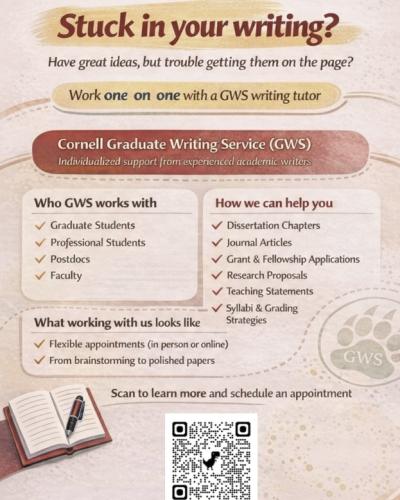The KNIGHTLYnews is an online forum where FWS instructors and other teachers of writing can swap and share ideas for best classroom practice. Weekly posts are designed to help teachers develop lesson plans and writing assignments, and respond to classroom challenges by introducing new teaching tools and sharing emerging pedagogical ideas. Posts also direct readers to program and campus resources that support teaching and learning, and provide opportunities for peer collaboration and mentorship. #teachlikeabear
Since 2017, I have been teaching a First-year Writing Seminar titled Jews on Film: Visible and Invisible. A few weeks in to my first fall semester teaching the course, I asked, “is anyone doing anything to celebrate Rosh Hashana?” Almost to a person, my students said, “we’re taking prelims.”
In my Jewish Studies classes, I never ask who is Jewish, but students tend to self-identify. More than half of the students who take my writing seminar identify as Jews. There are many ways of being Jewish and many ways of recognizing Jewish holidays. In this essay I provide instructors with information about the timing of the holidays; how observance affects class participation; and how instructors can accommodate and support their students. I also try to provide readers with some sense of the academic and emotional impact the Fall Jewish holidays have on students—especially First-year students. Links with more information are at the bottom.
Why does this matter?
All college students have to make decisions about time management. Students who observe the fall holidays almost always have to balance the personal value of religious observance against the cost of missing classes. Students who choose observance may miss as many as three full days of classes in a ten day period—and then play catch up. First-year students are anxious about this, especially when exams are scheduled on holidays. Prelims scheduled on or around Rosh Hashana and Yom Kippur are often the semester’s first prelims. For first-year students, these may be their first college exams.
When and how are Rosh Hashana and Yom Kippur Observed?
The Jewish calendar follows a lunar calendar: dates float relative to the Gregorian calendar. Rosh Hashana—the Jewish New Year—is celebrated in early Fall, usually in September. In 2025, the holiday will begin at sundown on Monday, September 22. Rosh Hashana is a two-day holiday (some Jews celebrate only the first day). Yom Kippur falls ten days after the start of Rosh Hashana. In 2025, Yom Kippur will run from sundown on Wednesday, October 1 to sundown on Thursday, October 2.
Observant Jews spend considerable time in synagogue on all three days. Jews who strictly observe Shabbat—the Sabbath—follow Shabbat rules on Rosh Hashana and Yom Kippur. Shabbat rules forbid many kinds of work. For strict observers this includes riding in or driving a car, turning on a computer, using a phone, and writing.
Most American Jews are not as strict in their observance. But plenty of people who rarely set foot in a synagogue show up on Rosh Hashana and Yom Kippur.
Then there’s the fast. On Yom Kippur, Jews abstain from eating or drinking from sundown on the first evening until dark the following evening. In practice, the fast lasts about 26 hours. Fasting Jews will probably eat a big meal before going to services on Erev Yom Kippur (Yom Kippur eve), then try to manage without food or water until after services end the following evening. On October 1, my family will sit down to dinner at about 4:45 pm. We will get up from the table in time to be in synagogue at 6:15. The closing service the following day will begin at 6:15 p.m. The fast officially ends at around 7:45 pm on October 2.
The combination of fasting and attending services for much of the day is exhausting. Even if one did not treat writing or using a computer as a violation of the holiday, anyone who observed the holiday with some combination of services and fasting would find schoolwork exceptionally challenging. It’s hard to read textbooks or solve problem sets when one has participated in several hours of services and hasn’t eaten in eighteen hours.
Jewish holidays are stacked one after the other in the fall. Sukkot begins soon after Yom Kippur: in 2025 Sukkot begins at sundown on October 6. Observant Jews follow Shabbat rules on the first two days and last two days of Sukkot’s eight days. Fewer students are likely request accommodations for Sukkot, but, if they do, their request should be taken seriously.
What impact does holiday observance have on schoolwork?
By now it should be clear that students will find it challenging to combine holiday observance and school obligations on these holidays. The most observant students—for whom religious observance is non-negotiable—will find ways to make up the work they miss. Students for whom observance may be flexible—the majority—will have to make difficult choices.
Cornell—especially the statutory colleges—draws heavily from New York State. Most people in New York state live in New York City or in the populous suburbs on Long Island and the Hudson Valley. Metro New York, which also includes parts of New Jersey and Connecticut, has the highest percentage of Jewish residents of any region in the country. (Metro Tel Aviv is the only metropolitan region in the world with more Jewish residents than Metro New York). Public school districts in New York City and many nearby municipalities in New York and New Jersey are closed on Rosh Hashana and Yom Kippur. (This accommodates Jewish students, Jewish teachers, and other school employees).
These holidays also include a social/familial dimension. Rosh Hashana is a time for festive gatherings. Breaking the fast at the end of Yom Kippur is a social event. As family events, these holidays are analogous to Christmas or Easter. Classes and exams are never scheduled on Christmas or Easter. College classes are almost always scheduled on Rosh Hashana, Yom Kippur, or both. Missing family gatherings may add a dollop of homesickness to the stew of difficult decisions faced by Jewish students.
What can FWS (and other) instructors do to support Jewish students?
First, and most important, instructors should provide reasonable accommodations. On the holidays, students are not just absent from class. Students engaging in religious observance may find it difficult or impossible to do work on those days. Teachers should make it possible for students to catch up without penalty. (For more information about Cornell’s official policies on student accommodations, a link to the Dean of Faculty’s website is below. For information about accommodating religious holidays, a link to Cornell’s page on religious observance accommodations is also below).
Second, a student’s FWS is likely their smallest class. Most first-year students take a steady diet of large, exam-driven classes. The face-to-face relationship between student and instructor may offer flexibility when it negotiating accommodations. Some students may travel to be with family for the holidays. Travel of this kind may not be religious observance, strictly speaking, but it should be considered with compassion and creativity. If you are not sure how to handle a particular situation, you might want to consult your college’s academic advising office, a member of the team at student and campus life or one of the other offices linked to below.
Third, recognize that Jewish students may find this period emotionally challenging. Before starting college, the fall holidays likely involved some combination of religious ritual and family tradition. Balancing school and religious observance was probably negotiated within families. Before coming to Cornell, some students attended schools that closed on Rosh Hashana and Yom Kippur. (For the past several years, the Ithaca City Schools have closed on Rosh Hashana and Yom Kippur, as well as on Diwali and Eid al Fitr. Families and local religious leaders supported these recognitions of religious observance, but the advocacy that had the greatest impact came from ICSD students).
Finally, while college students need to make their own decisions about religious observance, a sense of loss may accompany some decisions. Students may be away from family, perhaps for the first time, during a season when they are used to family celebrations. For these students, the mounting stresses of college can be compounded by layers of stress that may be invisible, but are real nonetheless.
Links:
Religious Observance Accommodations: from Student and Campus Life.
https://scl.cornell.edu/religiousaccommodations
Stanford University has a quick guide to religious holidays and holiday specific observance, including Jewish and Muslim holidays.
https://orsl.stanford.edu/religious-calendar
Academic Policies and Responsibilities: from the Cornell Dean of Faculty website.
Reach out to any of the following for guidance, clarifications of policy, or to solicit direct support of Jewish students:
Joel Harter, Director of Cornell United Religious Work
https://scl.cornell.edu/belonging-support-services/centers-student-equity-empowerment-and-belonging/office-spirituality-and-meaning-making/curw
Rabbi Ari Weiss, CEO of Grinspoon Hillel at Cornell
Rabbi Talia Laster, Campus Rabbi at Grinspoon Hillel at Cornell




